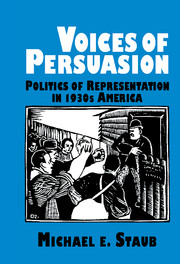Book contents
- Frontmatter
- Contents
- Acknowledgments
- Preface
- 1 Spoken Testimony, Unwritten History
- 2 John Dos Passos and James Agee: You Won't Hear It Nicely
- 3 John Neihardt, William Benson, and Ruth Underhill: Telling Native American History
- 4 Zora Neale Hurston: Talking Black, Talking Back
- 5 Tillie Olsen and the Communist Press: Giving the People Voice
- Notes
- Bibliography
- Index
- CAMBRIDGE STUDIES IN AMERICAN LITERATURE AND CULTURE
5 - Tillie Olsen and the Communist Press: Giving the People Voice
Published online by Cambridge University Press: 22 March 2010
- Frontmatter
- Contents
- Acknowledgments
- Preface
- 1 Spoken Testimony, Unwritten History
- 2 John Dos Passos and James Agee: You Won't Hear It Nicely
- 3 John Neihardt, William Benson, and Ruth Underhill: Telling Native American History
- 4 Zora Neale Hurston: Talking Black, Talking Back
- 5 Tillie Olsen and the Communist Press: Giving the People Voice
- Notes
- Bibliography
- Index
- CAMBRIDGE STUDIES IN AMERICAN LITERATURE AND CULTURE
Summary
MY VISION is very different from that of most writers,” Tillie Olsen said in 1974. “I don't think in terms of quests for identity to explain human motivation and behavior. I feel that in a world where class, race, and sex are so determining, that that has little reality. What matters to me is the kind of soil out of which people have to grow, and the kind of climate around them; circumstances are the primary key and not the personal quest for identity.” In Olsen's case, the “soil” from which her writing grew was unmistakably red. When she was eighteen, Olsen (then Tillie Lerner) joined the Young Communist League, the youth organization of the Communist Party. Eventually, political involvement brought her from her native Omaha, Nebraska, to the West Coast, where she became actively involved in the San Francisco General Strike in the summer of 1934. By 1934, Olsen also wrote whenever she could find the time and that year published a number of pieces in the Partisan Review, the New Republic, the Young Worker, and the Western Worker, among others.
Yonnondio: From the Thirties is Olsen's most significant accomplishment from that decade, although it was not published until 1974. Prevailing scholarship on Olsen's thirties career focuses on whether her engagement with communism helped or hindered the novel's effectiveness as literature. In a pioneering early critical assessment of Olsen's Depression-era work, Deborah Rosenfelt concluded that “on the whole, in spite of the Left's demands on her time and energies, the prescriptiveness of its more dogmatic criticism, and the androcentrism or outright sexism of many of its spokesmen, there is no doubt but that Olsen's Marxian perspective and experience ultimately enriched her literature.”
- Type
- Chapter
- Information
- Voices of Persuasion , pp. 110 - 140Publisher: Cambridge University PressPrint publication year: 1994

